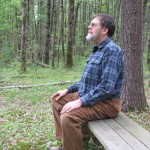Not too long ago, I was visiting the home of a close Pagan friend of mine, and I made mention of “God” in a conversation which included Laura’s very bright and inquiring son. Laura stopped me, saying, “In this house, when someone says ‘God’ we always ask, ‘which one?'” And it’s true–adopting monotheistic language can make polytheist, panenthest, animist, and nontheist points of view invisible. Laura, of course, was politely insisting I not marginalize her son’s religion (and hers) in her own home. The irony, of course, is that we’re co-religionists, she and I.
I don’t mind at all Laura calling me on apparently privileging monotheism, particularly in the context of her family life. But if I describe my experiences among Friends at NEYM this year in any detail, I’m going to wind up using a lot of words and phrases that may give my Pagan friends reason to get a little nervous about me “going native” in my time among Christians.
Rather than issuing some boilerplate about where I see myself in relation to Paganism or Christianity these days, I’m going to try to describe the names I give to my experiences. Just this once, I want to lay the labels aside. You can pick them up and put them where you think they belong when I get done, OK?
I know that Quaker worship works for me–when I am in worship with centered, seasoned Friends, I am convinced that I am experiencing the same Spirit which they feel, though our names for the experience may differ. And I’ve been working–especially hard while I was at Sessions, since there were some wonderful resources there for it–to listen deeply into the language and experience of Christian Friends. I don’t think my language and understandings match traditional Christian ones (even Quaker Christian ones) very much. But as my reading and my experiences have brought me to different places spiritually, I’ve been searching for language that reflects what I’m experiencing, and some of my understandings sound pretty monotheistic sometimes.
As I say, I’m convinced, based on the awareness that I am tendered when they are tendered and gathered when they are gathered, that the Spirit I experience in Quaker worship alongside my Christian friends is the same Spirit they are experiencing.
This Spirit seems to go by many names among Christ-centered Quakers. Never mind terms like “Inner Light” or Paraclete or Friend of Friends, this Spirit gets named Jesus, Christ, God, and Holy Spirit. Every aspect of the Trinity, from the historical Jesus right through the ineffable Ground of All Being gets identified with that Spirit.
My point here is that the Christian Friends themselves are not exactly, um… exact in describing the Source of this illumination. It’s blurry when they talk about it, and it’s blurry when I talk about it. I don’t call it Jesus, and I don’t call it Christ (though depending on what is meant by that term, I don’t know that I’d argue with it, either).
But I do call it God–just as if I knew clearly what that word meant, and were a convinced monotheist. However, what I’m really getting at with the shorthand word “God” isn’t exactly God, in the personified and monotheistic sense I think most Christians would use the word.
So what do I mean when I say God? What experience is it I am trying to name?
I use the word when I mean that Spirit I most often experience in images and an inward sense of power and intimacy. Usually, it’s an image of water–either a great sea of brightness, or a thundering river that is trembling and shaking within and around all things. So “God” means the almost unbearable flood of liquid light that I feel all around me when I worship.
In C.S. Lewis’s The Voyage of the Dawn Treader, King Caspian and the crew of the Dawn Treader have been sailing east, hoping to come to the kingdom of God–Aslan–when they reach a place where the ocean water becomes sweet and not salt.
The King took the bucket in both hands, raised it to his lips, sipped, then drank deeply and raised his head. His face was changed. Not only his eyes but everything about him seemed brighter.
“Yes,” he said,” it is sweet. That’s real water, that. I’m not sure that it isn’t going to kill me… It–it’s like light more than anything else,” said Caspian.
“That is what it is,” said Reepicheep. “Drinkable light…”
…And one by one everybody on board drank. And for a long time they were all silent. They felt almost too well and strong to bear it; and presently they began to notice another result. As I have said before, there had been too much light ever since they left the island of Ramandu–the sun too large (though not too hot), the sea too bright, the air too shining. Now, the light grew no less–if anything, it increased–but they could bear it… They could see more light than they had ever seen before.
That–that overwhelming drinkable light–that’s what I understand by “Spirit”–especially “Holy Spirit”–and “God.”
My sense is that all things rise from that sea of light.
Not that Light is its only aspect–sometimes my experience of God is of the deep, fertile richness of a forest (like Lewis’s description of The Wood Between the Worlds in The Magician’s Nephew, though I’ll spare you another extended quote.) Sometimes I understand it as a great tree, the Tree of Life, and that everything that lives, including the myriad spirits we call gods are manifestations of life springing from that Tree. Some beings are very close to Its roots–like gods–and other things–like individual rocks and worms and humans–are relatively farther away. But nothing is really separate from It.
“It” I said. I really don’t think of this Spirit as very personified. (Intimate, yes–personified, no.) I’m sure this isn’t a very satisfying point of view for a devout Christian, who feels a deep, intimate, and very personal connection with Jesus. But then, I don’t need it to be. Like Christians, I know a face of the unknowable God which is far closer to me, more personal, and that’s Herne.
I can’t help but see Jesus and Herne as similar, in at least one way–they are not God, but they are closer to that root of God (or able to bear more Light) than I am.
Not for a moment do I believe that Herne is Jesus. But neither do I believe that he is separate from that great Sea of illumination, because I think that Great Sea is within everything, and surrounding everything.
What of the famous scripture, “None may come to the Father save through me?” Well, first of all, I do not subscribe to the belief that the Bible is some sort of universal rule book. I don’t have to play by those rules, and I don’t have to make sense of those pages.
However, I have spent time thinking about it, over the years, and my sense has long been this: if Jesus really said that, and if it is really true, then I have to believe that either “the Father” is yet another face of that ineffable Source of everything, or that Jesus was speaking in a kind of metaphor, of his own ability to stand, flooded with Light and Spirit, so closely allied with it as to become lost in it. So it wouldn’t be the historical Jesus who was the Way–it would be that illuminating energy. (I suspect that some Christians would term that Christ, and distinguish it somewhat from the historical Jesus. But maybe not.)
If “God” is the Tree, then the trunk is nearer to the root than are the tips of the branches. I can buy Jesus as one of the branches. I can even accept “Christ” as one of the terms for that trunk (or even the root). But there’s a part of me that cannot, will not, does not know how to accept the notion that once and only once in history, a door opened to the Spirit. All my experience of God and Spirit is that the big things, the things that matter, happen over and over.
I think in the wheel of the year. Life is cycles; Spirit returns and renews itself endlessly. For all of history and prehistory, here and to the ends of the universe, to be prelude and epilogue to one tiny event in the Middle East strikes me as absurd. My heart rejects it. My spirit rejects it. God is too big to fit into that one tiny narrative.
I do feel that some of what we call “gods” (and here I’m using the lower case to refer to a class of spirit beings, relatively more personified than that sea of Spirit I’m calling “God”)are closer to or farther from the Root of that great Tree than others are. For me, Herne is in a sort of foreground of “God Stuff”–closer to me than that Root or Sea, certainly. Perhaps too close to pray to.
Where’s Jesus on that family tree? I’ll leave that question to those who know him. I don’t think I’ve got a clue.
I do pray, though. (There’s another word that Pagans may have trouble with.) Sometimes I do so spontaneously, and sometimes when someone asks me to. And on those occasions, I find myself calling out to Spirit as the Lady–the Great Goddess I learned to worship among Pagans, “known by many names among men.” If I pray, She is the face of the divine I automatically pray to. (Capitalization here is an attempt to reflect that I experience her as closer to that Source, and thus less personified.) If “none may come to the Father save through me,” and if the Father is that Root, then I think I find my way to it through Her. (Does that make the Lady Christ? The Holy Spirit? Or shall we simply set the Scripture aside–as I’m sure my Pagan readers are more than ready to do, having been beaten over the head with it for years and years…)
So prayer, for me, is the Lady’s turf. But when I am reaching out for the Beloved, it is generally Herne’s presence I hope to feel–the life of the forest, the animals, the give and take of life in a body with sweat and tears and lust and love of Earth which he holds for me.
And when two Christian Friends at Sessions this year spoke with tears in their eyes of having become not merely Friends, but Christians, followers of a beloved Jesus, through their contacts with Kenyan Friends whose faith in Christ was profound…well, the answering tears of tenderness in my own eyes were from the reminders of how precious my relationship to my own Beloved Friend has been. The tenderness and intimacy they felt was met with an answering tenderness and intimacy I could understand, because I love my god, too.
What a muddle, I’m sure someone out there is thinking. Maybe so. Certainly, I’m aware of a host of influences (some even outside of the works of C.S. Lewis, believe it or not) that may have affected my thinking. But part of the reason that I’m presenting this as a muddle is that I’m trying to be as far from notional as I can. These are not, really, my ideas. These are the understandings of my experience that undergird my use of language.















